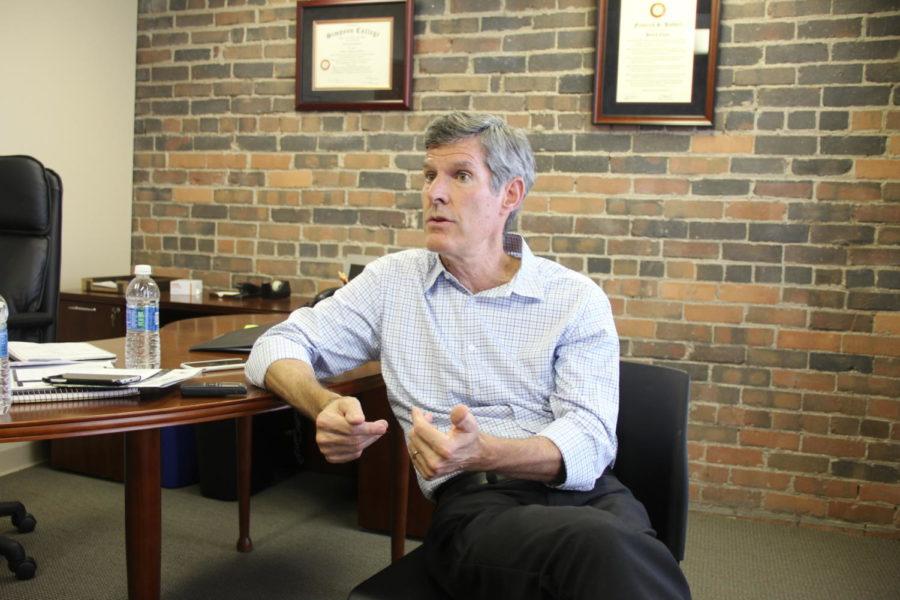Democrat Fred Hubbell discusses vision for Iowa
Fred Hubbell, a Des Moines businessman and philanthropist, and member of one of Iowa’s founding families, is seeking the Democratic nomination for governor in 2018.
July 26, 2017
Terrace Hill has had a prodigal presence in downtown Des Moines since its purchase by Frederick Marion Hubbell in 1884. Today, the 18,000-square foot building serves the dual purpose of the official governor’s residence and a National Historic Landmark.
On a sticky Friday afternoon in a nearby downtown business building, Iowa Democrat Fred Hubbell is sitting behind a cedar-colored desk, legs crossed and arms folded, working to establish his identity as the premiere candidate for governor of Iowa.
Hubbell reaches for a half full water bottle and opens the cap.
“The two best resources we have are our land and our people,” Hubbell says before taking a sip and setting the bottle down. “If we don’t invest in both of those, the future of Iowa is not going to be equivalent for [young Iowans] as it was for us growing up.”
Hubbell, 66, is a fifth-generation Iowan whose family has a history deep rooted in a tradition of business and philanthropy in the state.
Hubbell announced that he would run for a chance to return to his family’s former home on July 17, as Terrace Hill was donated by earlier Hubbells to the state in 1971.
“We still have to go through a primary and general election first,” Hubbell said. “I would be happy to continue that tradition, though there might be a few ghosts in there.”
Hubbell has served as a chairman for Iowa retailer Younkers and president of Equitable of Iowa, a life insurance company. He also served as as interim director of the Iowa Department of Economic Development. For three decades, Hubbell served on the board for Simpson College.
“That’s what always interested me, the economics and growth about the state,” Hubbell said. “There’s no getting away from the fact that most new jobs are created in five cities (nationally) in the last year. My own view is that we need to try to grow the number of quality jobs all across our state.”
Hubbell said that the key to a healthy job market is education.
After announcing his race for governor, Hubbell began a week-long tour across Iowa dubbed “Get Iowa Growing.” The purpose of the tour is the nexus between job growth and education, Hubbell said.
In reference to rural job growth, Hubbell said that the Branstad and Reynolds administrations have talked a lot about developing small communities, but have failed to deliver.
He was critical of Branstad’s funding of the $2 billion fertilizer plant in Wever, Iowa. The plant began operations in April following five years of construction.
“That’s where we should be focusing our economic development is small communities,” Hubbell said. “That doesn’t mean you should put it in every small town across the state, but it does mean that we can create a lot of locations where people can live and work.”
Hubbell said that Iowa families could see an increase in incomes as a return for an improved investment in education. For hubbell, the first step in improved education is solving budget issues. He said that he would also encourage Iowa businesses to invest in education.
In an effort to reduce student debt, Hubbell said that he would ask campus administrators and counselors to encourage their students to attend community colleges and job training facilities
“Counselors are telling their students to get a four-year education, and I’m not against that,” Hubbell said. “Four year educations are not for everybody. There are $70,000 to $100,000 jobs available six years out of high school with no debt.”
While on the board at Simpson College, Hubbell said that the college saw an increased demand for mental health services. As a result, Simpson hired more personnel.
Hubbell said that the number of people willing to talk about mental health is increasing, though many Iowans do not have adequate access to healthcare.
“I don’t see any leadership from our governor and our legislature other than trying to reduce access to health care,” Hubbell said. “Rural hospitals are struggling. Privatized medicaid isnt working. There’s a lot of fear and anxiety out there. It hurts productivity and family lives.”
U.S. Education Secretary Betsy DeVos has left many uncertain on the future of the Obama Administration’s compliance guidelines related to Title IX, the 1972 law that guarantees protection against discrimination on the basis of sex in all educational settings.
Hubbell said that he is a supporter of Title IX training and that the training should be implemented in all work settings, specially the legislature.
He referenced a recent lawsuit in which a jury awarded nearly $2.2 million to a Iowa caucus staffer who said she got fired after complaining about sexual harassment and retaliation in the workplace.
“The example that elected officials are setting is not good. Sexual assault goes both ways, men against women and women against men. We should have adequate training on the topic,” Hubbell said.
On the subject of expanding Highway 30 to a four-lane highway, Hubble said that he was undecided, as he did not bear adequate knowledge of interstate commerce in Iowa.
He said that he does not have vested interest in any city that would sway his opinion for or against the expansion of any highway in Iowa.
“I’m not a fan for putting roads out there just to have roads,” Hubbell said. “Any decisions that I get involved with, in that area, are going to be based on what makes them most sense to the state.”
Hubbell will be campaigning against six other democrats in the 2018 race for governor. The Hubbell campaign has already raised over $1 million, according to the Cedar Rapids Gazette. Sally Pederson, former Lieutenant Governor of Iowa, will serve as chair of Hubbell for Governor.







